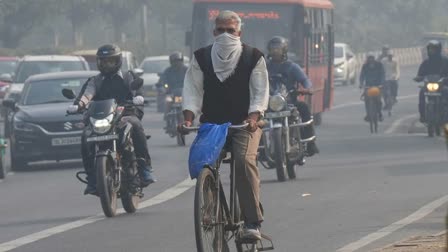The marginal improvement in air pollution that Delhi residents have experienced owing to strong winds over the past few days continued on Wednesday with the air quality remaining in the lower end of “very poor”, data showed.
However, experts warn that this temporary relief may not last, with pollution levels likely to rise over the weekend as wind speeds decrease.
The 24-hour average of the Air Quality Index (AQI) stood at 303 (“very poor”) at 4pm, when the Central Pollution Control Board (CPCB) takes its daily reading for a city.
This was a notable improvement from Tuesday’s AQI of 343 (“very poor”), CPCB data showed.
Out of the 38 monitoring stations providing data in Delhi on Wedesnday, 17 recorded “poor” air quality, while the remaining 21 remained in the “very poor” category.
In contrast, Delhi’s satellite towns fared better, with Faridabad’s AQI at 186 (“moderate”) and Noida, Ghaziabad, Gurugram, and Greater Noida falling in the “poor” category with AQI readings of 207, 215, 217, and 230, respectively.
CPCB classifies AQI between 0 and 50 as “good”, between 51 and 100 as “satisfactory”, between 101 and 200 as “moderate”, between 201 and 300 as “poor”, between 301 and 400 as “very poor”, and over 400 as “severe”.
The Air Quality Early Warning System said in a bulletin that while air quality will be in the “very poor” category till Saturday, it is further expected to worsen in the days after.
The India Meteorological Department (IMD), meanwhile, said that a western disturbance is forecast is likely to influence India’s northwestern regions in the coming days. IMD has also issued a yellow alert for Friday, warning people of a moderate to dense fog in the morning.
Mahesh Palawat, vice president at Skymet, said, “The wind speed of the westerlies affecting Delhi was considerably good on Wednesday as well, which kept the pollution levels down. It was nearly 12-13 kmph in the afternoon and 6-8 kmph in the morning.”
“However, a western disturbance will start influencing the region, which will bring the wind speed down and pollution levels may rise again. Additionally, some easterlies might also be observed from Friday, which can bring up the humidity,” Palawat added.
Delhi’s minimum, on Wednesday, was recorded at 10.4°C, same as the normal for this season, and 1.5°C lower than a day before. The maximum was recorded at 27.3°C, one degree above normal, as compared to 26.7°C on Tuesday.
According to IMD, the maximum and minimum are both expected to go down a notch by Thursday and hover around 26°C and 9°C respectively. The season’s lowest so far was 10.2°C, recorded on November 21.
Enforcement of anti-pollution measures
Meanwhile, the Delhi Police commissioner has directed all 15 district units and PCR teams to assist the traffic police in enforcing pollution control measures under the Graded Response Action Plan (GRAP) Stage 4.
Traffic police personnel, numbering over 5,000, have been prosecuting violators since the implementation of GRAP Stage 3 on November 15 and Stage 4 on November 18. These measures target end-of-life vehicles, BS-3 petrol and BS-4 diesel vehicles, and vehicles without valid pollution-under-control (PUC) certificates.
However, police officers said that 5,000 officials can’t control an entire city and the commissioner then advised police to rope in staff from the 15 districts.
A senior police officer said, “The deployment of district police personnel at border pickets and around the city has been increased. All police pickets have been turned into traffic checking points. Also, each district has been provided with 20 challan machines.”
The district staff, who usually don’t meddle with traffic laws, are now prosecuting offenders for various traffic violations, the officials cited above said. “We have been asked to ensure no GRAP 4 violations are going on. So, we are keeping a track on PUC certificates, overages vehicles, BS-4 vehicles, construction in the area, commercial vehicles carrying construction material openly etc,” said the officer.
Senior police officers have also asked PCR unit of the Delhi Police to provide 88 Prakhar vans to traffic police for helping in prosecution. Police said the vans will be positioned around borders, arterial roads and other heavy footfall areas to check if Stage 4 violations are taking place.
At borders, extra checks and measures are being taken as police said heavy vehicles from other states enter Delhi and violate laws.







